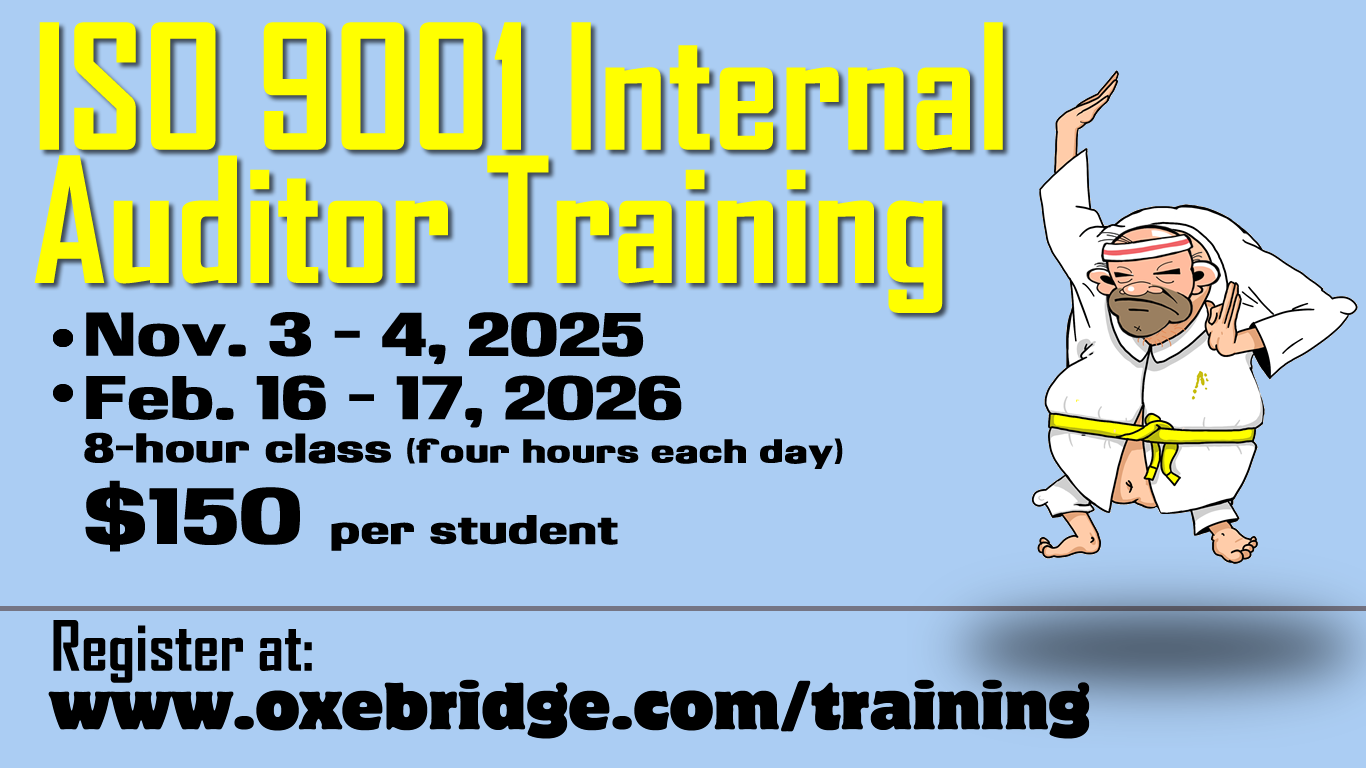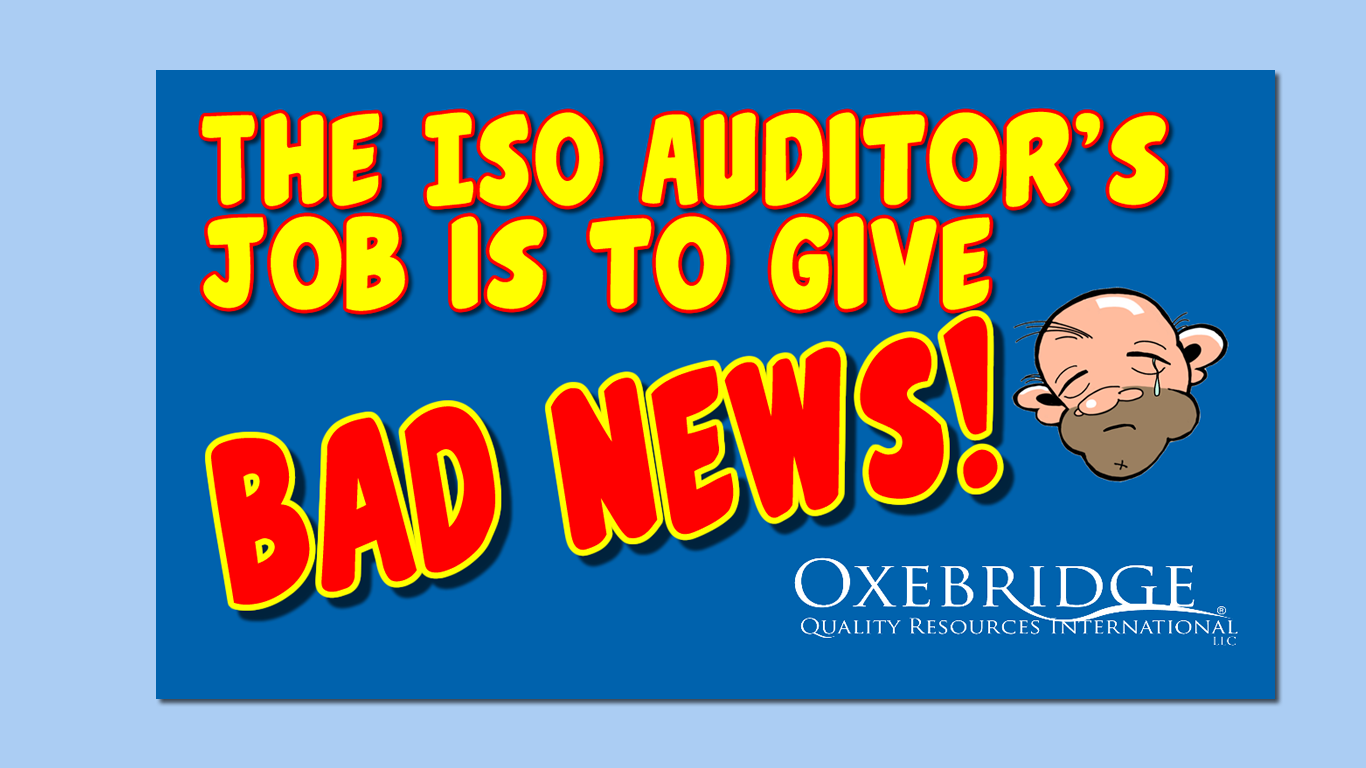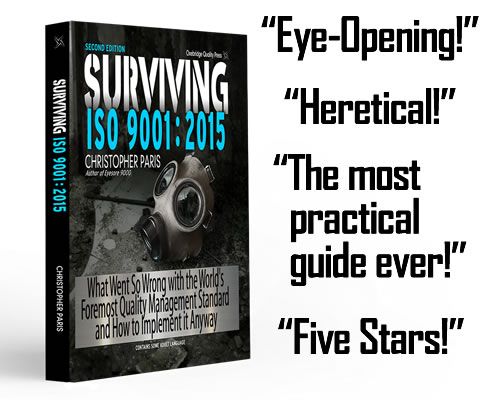 [UPDATE 27 August 2016: See text in red below.]
[UPDATE 27 August 2016: See text in red below.]
This just dropped in my lap the other day, as I spoke with a company that had been shopping for ISO 9001:2015 upgrade services. Now keep this in mind: this company already has a certified ISO 9001:2008 system in place, and just wants to update to the 2015 version. They have less than 50 employees, in a single location, in a fairly simple office environment. They do program management activities, so there’s no manufacturing or design going on.
The company contact — let’s call him Bill — reported to me that they had reached out to a consultant who boasted that he was a member of the US TAG to ISO TC 176, that plucky gang who wrote the new ISO 9001:2015 standard. I confirmed, yes, he’s on the committee, so he wasn’t lying about that.
The consultant, as part of his sales pitch, insisted that if Bill were to shop around to other ISO 9001 consultants, he should ensure they are, themselves, ISO 9001 certified; the old “walk the walk” argument. I told Bill that no, that’s not an ideal arrangement, because it telegraphs that the consultant is open to getting into conflicted relationships with registrars, and the profession should shun any consultant/registrar collusion. What do I mean? Consider this: if a consultant is ISO 9001 certified by one registrar, that opens up a host of problems, not the least of which is whether that registrar will “go easy” on the consultant’s clients, lest they lose the auditing contract with both the consultant and his clients.
Next, Bill told me the consultant said if any other consultant doesn’t have at least five “ISO 9001:2015 certified” clients by now, they “don’t know what they hell they are doing.” I told Bill that it sounds nice, but seeing as how the standard came out, effectively, in October 2015, and that many registrars still haven’t updated their auditing programs to even offer certification to the new standard, the advice was equally meaningless. As I write this, I am at a client who cannot update their system because the registrar “isn’t ready,” and we implemented the new standard back in January. But this also points to the possibility that the consultant — again — has some relationship with certain registrars, such as BSI, which began issuing certificates only minutes after the standard was released. The oddest aspect of this, however, was that the consultant’s own company does not appear to be ISO 9001 certified, or at least there’s nothing mentioning it on his website. So I have no idea what he was on about, unless — gasp! — a TC 176 guy was lying to people about being certified when he wasn’t. The horror!
But the stunner was the price that the TAG guy quoted. Again, for a project management company with less than 50 employees at a single site, which is already ISO 9001:2008 certified, the consultant quoted $33,000 fee, plus expenses; given that the consultant is from the northeast, and the client in the south, this would easily bring the total contract fee to $45,000 or more, factoring in hotels, airfare, rental cars, etc.
UPDATE: It gets worse. I just reviewed the quote again, and found that the consultant openly boasts that his update work will rely on TEMPLATES. He’s not even writing the material from scratch. He’s using pre-written templates that he’s presumably used for other clients, no matter what industry. While this isn’t unusual — most consultants have to start with something — there’s no amount of “customizing” a template that could justify this cost. Furthermore, the quote indicates that some of the work — it’s not clear how much — is done off-site, presumably by the consultant as he sits in his underwear on his yacht or something.
Holy mother of grapefruits. $45,000 just to upgrade to the new standard. I can’t remember the last time an Oxebridge client paid that for a from-scratch implementation of even an integrated management system based on multiple standards. It defies belief. Oxebridge’s most expensive option for upgrading costs about $12,000 plus expenses, and companies with up to 150 employees are eligible. That means the TAG consultants are charging almost four times as much as a reasonable going rate.
As I’ve said, the TAG consultant problem is a serious one. The TAG, under the leadership of Jack West, Lorri Hunt, Alka Jarvis and Paul Palmes, has converted itself into a machine that is focused singularly not on creating the best ISO 9001 standard possible, but instead ensuring they create an environment that rewards the private consulting practices of its members. That’s bad enough, but if TAG consultants are gouging people at rates four times a reasonable rate, it’s just too much.
So there you have it. Before you hire a TAG consultant, consider that not only are they nipple-deep in conflicts of interest, they’re probably also quoting you a price that should make your eyes bleed.
Did you get an insanely high quote from a US TAG member for ISO 9001 upgrading? Or maybe just from some other idiot? Send me the quote. I won’t publish it, but I’d love to see it.
Christopher Paris is the founder and VP Operations of Oxebridge. He has over 35 years’ experience implementing ISO 9001 and AS9100 systems, and helps establish certification and accreditation bodies with the ISO 17000 series. He is a vocal advocate for the development and use of standards from the point of view of actual users. He is the writer and artist of THE AUDITOR comic strip, and is currently writing the DR. CUBA pulp novel series. Visit www.drcuba.world








